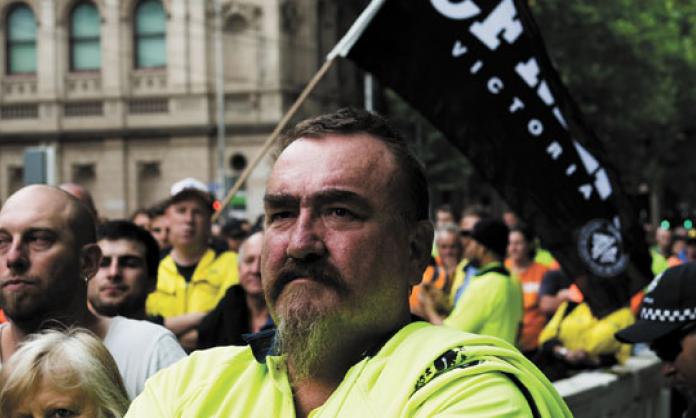As any good management textbook will tell you, the modern workplace is all about teamwork, co-located synergies and wellness, in keeping with today’s dynamic, fast-paced world. Concepts like class conflict and industrial struggle, we are told, have gone the way of the microwave cookbook: still hanging around but essentially quaint relics from a bygone era.
Yet, as the recent Royal Commission into Trade Union Governance and Corruption demonstrates, new-age paradigm-subverting goes only so far. Indeed, bosses and their mates in the Liberal Party still approach workers’ collective organisations much as they have always done: like cats to baths.
The main reason for this can be found using a simple desk calculator. The greater the amount bosses have to spend on workers’ wages, the less they will rake in as profit. Because unions fight for higher wages and better conditions for workers, when successful they cost bosses money. This might mean a CEO forgoing their beach house renovation, or a season’s skiing in the Alps. So you can understand why they get so worked up about it.
In Australia, unionised workers earn about 10 percent more and enjoy better conditions than their non-unionised counterparts. In Europe, the differential is similar. In the US it is a whopping 18 percent. Studies have shown that in Australia this applies across income levels, in different sectors of the economy and between men and women.
Unions can win these gains because they draw on the one weapon workers have against the boss: the ability to act collectively and disrupt production.
Many pages of the Royal Commission report are devoted to bosses whingeing about workers’ willingness to do this, and the way in which unions such as the CFMEU encourage it. Singled out for special mention is pattern bargaining, the process whereby poor defenceless bosses are forced by unions to concede standard conditions across an industry.
It is described in the report as “true evil”, because it derives from “an inequality of bargaining power that can lead to anti-competitive and unproductive outcomes”. “True evil” to bosses is when workers are able to exert some control over the conditions of their employment, without concern for profit. That and a bad snow season.
Car magnate Henry Ford got to the heart of it when he once complained: “Why is it that when I hire a pair of hands I get a human being as well?” Fundamentally, bosses resent the fact that workers are not just another inert component of production, but are humans with the ability to think, organise and rebel. And form unions.
This is why bosses and governments require media empires, mass educational institutions and religious establishments to maintain political stability and promote their individualistic, competition-driven ideology.
Unions, by contrast, encourage a sense of collective identity and solidarity, which is anathema to the values of capitalism and which has the potential to undermine the status quo.
Workers with an understanding of their own position in society are much more likely to sympathise with others who are oppressed or vilified, whether they be refugees, LGBTI people or Muslims. Their own antagonistic relationship to the powerful, of which unions are the organisational expression, can cause them to be more suspicious and distrustful of the powerful and their agenda. This makes it much more difficult for the bosses to rule.
But more than simply being less open to influence, an organised working class also has the potential to form an alternative political centre of gravity in society that no other social grouping does.
At times of high class struggle, this has become apparent to wide layers of people, and become a threat to the system itself. Bosses and government recognise this potential in every act of resistance and demonstration of union power. Hence why police show up at every picket line and protest: it is an assertion of who is in control and who needs to be controlled. And hence why they are prepared to spend unlimited time and effort to discredit and smear the image of unions.
The bosses resent the fact that unions play such a prominent role in politics, and want to push them back and force the Labor Party to distance itself from them. It’s important they don’t succeed.











